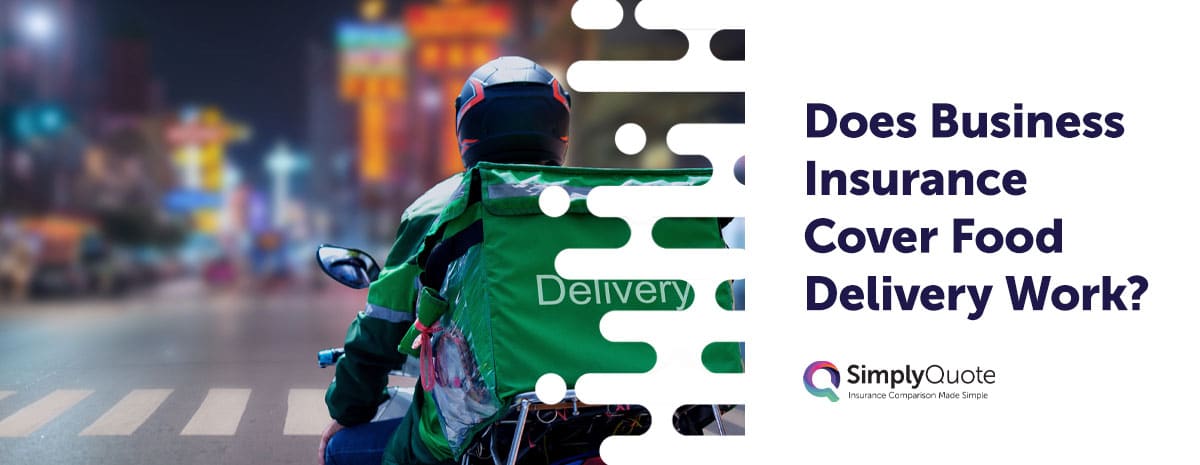Does business insurance cover food delivery work?
Those looking to start working as fast food delivery drivers may wonder what insurance cover they need, and whether their current insurance policy will cover them.
If you have business use car insurance in place, you sadly won’t be covered for food delivery work, and you will need specialist insurance to make sure you’re legally compliant and protected.
Read on to discover what business insurance is, which food delivery insurance you need, and how SimplyQuote can help you save on your insurance cover.

What does business insurance cover?
Business use insurance is a type of car insurance policy that covers you if you use your car to travel to multiple locations for work. For example, if you use your personal car to drive to different meetings and liaise with clients at their offices, you’ll need business insurance to cover all business-related car trips.
There are three types of business use car insurance policies, none of which would cover delivery drivers:
- Class 1 – Covers you if you drive to several places of work (the driving simply takes you to the location where you get paid for the work; driving is not part of the job). For example, a physiotherapist who drives to clients’ homes.
- Class 2 – Similar to Class 1, but includes an employee or coworker too (i.e. a named driver).
- Class 3 – Includes commercial travelling, often over long distances. For example, a travelling salesman would need this type of insurance.
Business insurance policies differ, but typically include:
- Public liability cover – Protects you should you injure or damage the property of a member of the public.
- Employers liability insurance – A legal requirement in the UK if you employ staff, including volunteers or part-time workers. Protects you should one of your employees become sick or injured while on the job.
- Professional indemnity insurance – This is voluntary for UK business owners and protects the business if you were negligent with your work (e.g. a mechanic used a faulty part).
Will business use car insurance cover delivery drivers?
No, generally this type of insurance won’t include food delivery, but it will depend on the exact insurance policy you have.
For example, if your policy includes hire and reward insurance, you will be able to deliver parcels (including food parcels) in exchange for money.
Note: Most business insurance policies don’t include hire and reward insurance, so make sure you check your policy carefully before you start delivering food.
Looking cheap food delivery Insurance? Get your quote today!
Get QuotesWhat insurance will you need as a delivery driver?
If you wish to use your car to deliver food from restaurants or grocery stores, you need to get delivery driver insurance.
Specifically, you will need a type of commercial car insurance called hire and reward (H&R) insurance.
But you’ll need more than just delivery insurance, especially if you also use your delivery vehicle for personal use.
Here are all the different types of insurance you’ll legally need if you wish to work as a food delivery driver:
Social, domestic and pleasure (SD&P) car insurance
If you wish to drive on public roads in the UK, you will legally require SD&P insurance. This covers you if you use your car for personal or everyday use, like driving to the shops or to visit friends.
H&R car insurance
If you wish to make deliveries in exchange for payment, you’ll need H&R insurance – it’s a legal requirement. There are three levels of cover you can get (the same as standard car insurance):
- Third-party only (TPO) – It’s the minimum legal requirement in the UK and provides cover if you injure a third party or damage their property while driving. It doesn’t provide you or your vehicle with any cover if you’re at fault.
- Third-party, fire and theft (TPFT) – Includes third-party only cover and will also cover you if your vehicle is stolen or damaged in a fire.
- Comprehensive cover – Comprehensive insurance includes TPFT and also any damage to your vehicle (even if you caused it). May also include breakdown cover, windscreen cover, legal expenses and medical cover.
Hire and reward insurance is also called:
- Food delivery insurance
- Courier insurance
- Fast food delivery insurance
- Uber Eats insurance
- Just Eat delivery driver insurance
- Delivery insurance
Expert insight: If you wish to work as a food delivery driver part-time, you can get pay-as-you-go delivery insurance. With this policy, you can “switch on” your insurance cover when you are working. You either pay per hour or per mile.
What add-ons can you get for food delivery insurance?
If you wish to be covered for all eventualities while you’re making deliveries, consider getting the following add-ons to your policy:
- Goods in transit insurance – Covers the goods (i.e. the food parcels) you’re delivering should they be damaged or stolen. It’s not usually necessary since the food you’re delivering has low value, but it could still be worth considering.
- Public liability insurance – This is often added to your H&R policy, so make sure to check first. It covers you should you injure a member of the public or damage their property.
- Personal accident insurance – This cover will compensate you if you’re injured while making deliveries. It will also cover lost income if you’re permanently injured or disabled.
How much does food delivery insurance cost?
The cost of food delivery insurance varies between different insurance providers, but you can expect to pay:
- Third-party only – £220 per month
- Comprehensive – £260 per month
These rates are calculated for a 40-year-old delivery driver.
However, insurance premiums are variable, depending on several factors.
What influences the prices of food delivery insurance?
- Age of the delivery driver
- How many hours you work
- What time of the day you’re making deliveries
- Location
- Type of vehicle
- Your voluntary excess
- Claims history
How can you reduce the cost of food delivery insurance?
- Pay annually to avoid interest on monthly instalments.
- Shop around and use SimplyQuote to compare different insurance quotes.
- Avoid working in peak traffic or dangerous locations.
- Limit your annual mileage.
- Increase your voluntary excess (but make sure you can still afford it should you have to make a claim).
- Park your delivery vehicle in a secure location when not in use.
- Avoid over-insuring by only getting the add-ons you need.
How To Compare Insurance With SimplyQuote?
Comparing insurance quotes with SimplyQuote couldn’t be simpler:
- Complete the online form with your personal and vehicle details.
- Choose your level of cover and policy add-ons.
- Compare quotes from leading insurance providers in the UK.
- Save money by finding the best deal today.
Final thoughts
Food delivery drivers won’t need business insurance to drop off food parcels or groceries. However, they will need the correct policy in place, which includes a type of commercial car insurance called hire and reward insurance.
Once you have this insurance policy in place, you can make food deliveries knowing you will be completely covered should you be involved in an accident.
Frequently Asked Questions
You will need business use car insurance if you use your car to drive to multiple work locations, or if one of your coworkers or employees uses a business vehicle to drive to work locations. This includes:
- Driving to meetings or work sites at several locations (e.g. tradespeople).
- If you need to run a business-related errand during working hours.
- Door-to-door sales.
- If you’re driving clients around in your vehicle.
- Colleagues having to drive your car.
People working the following jobs should consider getting a business use policy:
- Plumbers, electricians or building contractors
- Consultants
- Estate agents
- Company executives
- Freelancers who work at multiple locations
Hire and reward insurance is a type of commercial vehicle insurance that’s required by anyone who makes deliveries in exchange for payment. It applies to delivery drivers as well as taxi drivers who transport passengers or goods.
